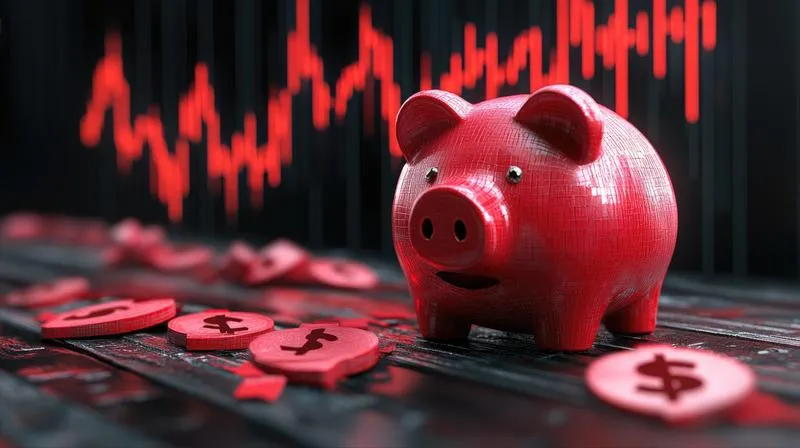
What Happens If the Dollar Crashes Tomorrow?
The U.S. dollar has long been the backbone of the global economy, a currency relied upon by countries, corporations, and individuals worldwide. But what happens if the unimaginable occurs and the dollar suddenly crashes? With inflation rates climbing and global economic uncertainty on the rise, it’s a question worth considering. If the dollar were to collapse, it wouldn’t just affect the stock market—it would ripple across every aspect of daily life, from the price of groceries to international trade.

In this article, we’ll explore the potential consequences of a dollar crash and, more importantly, how you can prepare to survive when traditional currency is no longer reliable.
What Would Cause the Dollar to Crash?
A currency crash happens when the value of a nation’s currency plummets due to various factors, including:
Hyperinflation: Rapid inflation decreases the value of currency, leading people to lose confidence in it as a reliable store of value.
Debt Overload: If the U.S. government accumulates too much national debt without credible plans for repayment, it can undermine the dollar’s credibility.
Loss of Reserve Status: The U.S. dollar is the world’s reserve currency, but if nations decide to move away from the dollar in international trade, it could trigger a decline in demand, causing its value to fall.
Global Conflict or Catastrophe: Major geopolitical shifts or natural disasters could disrupt economies worldwide, leading to a collapse of the dollar and global financial systems.
Immediate Consequences of a Dollar Crash
If the dollar were to crash overnight, the immediate consequences would be severe. Here’s what you can expect:
Hyperinflation: Prices of everyday goods would skyrocket as the dollar becomes worthless. Groceries, gas, and essentials would cost exponentially more.
Supply Chain Disruptions: Imported goods would become prohibitively expensive or unavailable due to the increased cost of foreign currencies.
Banking System Collapse: Banks would struggle to stay afloat as loans and debts would be impossible to pay back, causing massive closures and loss of savings for most Americans.
Social Unrest: Economic instability would likely lead to civil unrest, as people struggle to access basic necessities and financial systems fail.
How to Prepare for a Dollar Crash
A dollar crash can happen suddenly, but there are critical steps you can take now to ensure that you and your family are prepared for a financial collapse:
1. Bartering Skills and Trade Networks
When traditional currency loses its value, barter systems often replace cash transactions. Start considering what goods, services, or skills you have that could be valuable in a cashless society. Items like food, fuel, medicine, and even tools can be used as currency in times of crisis. Building relationships with trusted people in your community or network can also help you trade and barter for what you need.
2. Diversify Your Assets
Don’t keep all your wealth in cash or bank accounts. Consider holding assets like:
Precious metals (gold, silver) that tend to retain value during times of currency devaluation.
Cryptocurrencies like Bitcoin, which some people believe could replace traditional currency in the event of a dollar collapse.
Foreign currencies to hedge against the fall of the U.S. dollar.
Tangible goods such as real estate, tools, and supplies that can be used or traded in times of crisis.
3. Stockpile Essential Goods
In the wake of a currency collapse, supply chain disruptions will make basic necessities harder to come by. Building a stockpile of food, water, and essential supplies ensures that you’ll have what you need to survive the immediate chaos. Consider keeping:
Long-term storage foods (grains, beans, canned goods)
Water filtration systems and purification tablets
Medical supplies (first aid, prescription medicines)
Basic tools for gardening, cooking, and home maintenance
4. Invest in Self-Sufficiency
In a post-dollar world, relying on external systems will become increasingly difficult. Start working toward self-sufficiency by:
Learning to grow your own food through gardening or hydroponics.
Generating your own energy, whether through solar panels, generators, or other alternative energy sources.
Building skills in homesteading: Skills like woodworking, food preservation, and basic construction will be invaluable when money has no use.
5. Build a Financial Contingency Plan
If the dollar crashes, banks and institutions might freeze or limit access to funds. Having a contingency plan can help you maintain financial stability:
Keep cash on hand for immediate needs before a complete collapse.
Maintain a foreign bank account or invest in foreign currencies that may hold value during an American financial collapse.
Debt Management: Pay down high-interest debt and avoid accruing new liabilities to reduce financial pressure if interest rates spike or the economy tanks.
Long-Term Survival in a Cashless Society
In the long term, surviving the collapse of the dollar will require adaptation and resilience. As society restructures and finds new ways to operate without a stable currency, those who are adaptable will thrive. Focus on:
Building community relationships to share skills, resources, and knowledge. Survival is easier when you have a support network.
Keeping an open mind about alternative forms of currency or trade. In the past, goods like food, ammunition, and even alcohol have served as currency in times of crisis.
Staying informed: Monitor global financial trends and understand how international markets may affect the U.S. dollar. Being proactive can help you stay ahead of the collapse.
Conclusion
A dollar crash may seem far-fetched, but as economic uncertainty grows, it’s a scenario worth considering. While no one knows exactly how or when such an event might occur, preparing for financial instability now will give you the best chance of not only surviving but thriving in a world where the dollar no longer holds value.
By diversifying your assets, building a stockpile, and investing in self-sufficiency, you can protect your family from the chaos that would follow a dollar collapse. While the future may be unpredictable, you don’t have to face it unprepared.
